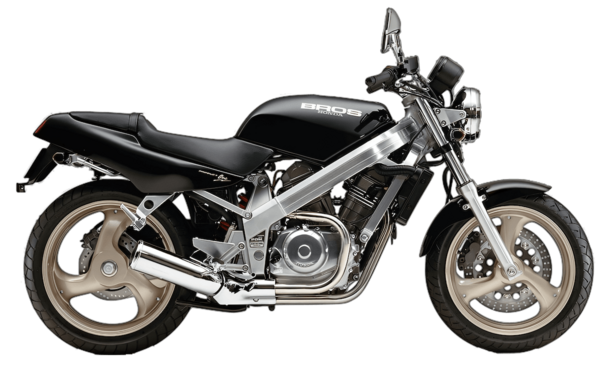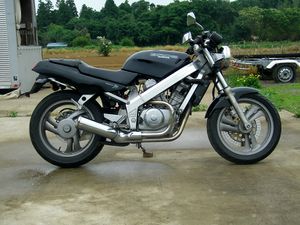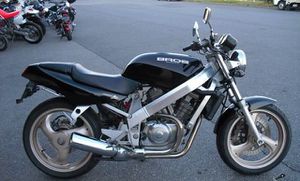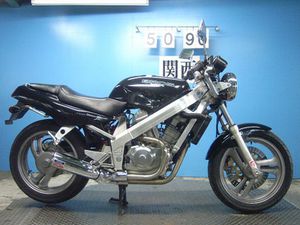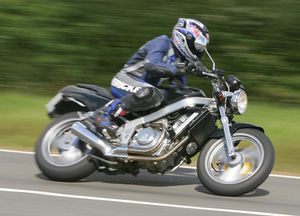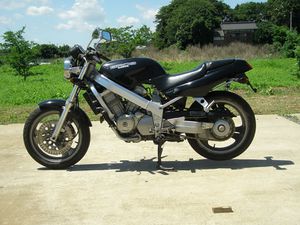Difference between revisions of "Honda Bros 400"
m |
m |
||
| Line 8: | Line 8: | ||
The naked model '''Honda Bros 400 (NT400)''' was introduced in 1988 simultaneously with the release of the older version [[Honda_Bros_650 | Honda Bros 650]]. The main differences between the Bros 400 and [[Honda_Bros_650 | Bros 650]] were the engine, carburetors and gearbox ratios. In all other respects, they are practically identical motorcycle. The Honda NT400 Bros model was sold only in the domestic Japanese market, was not officially exported anywhere and did not have export modifications (unlike [[Honda_Bros_650 | Bros 650]]). | The naked model '''Honda Bros 400 (NT400)''' was introduced in 1988 simultaneously with the release of the older version [[Honda_Bros_650 | Honda Bros 650]]. The main differences between the Bros 400 and [[Honda_Bros_650 | Bros 650]] were the engine, carburetors and gearbox ratios. In all other respects, they are practically identical motorcycle. The Honda NT400 Bros model was sold only in the domestic Japanese market, was not officially exported anywhere and did not have export modifications (unlike [[Honda_Bros_650 | Bros 650]]). | ||
{{Ads_top}} | {{Ads_top}} | ||
| + | |||
| + | ''' Main competitors: ''' | ||
| + | * [[Yamaha_SRX400 | Yamaha SRX400]] | ||
| + | * [[Suzuki_SV400 | Suzuki SV400]] | ||
| + | |||
The Honda Bros 400 was designed for novice pilots with an entry-level driver's license. The low stance, light weight and smooth engine make this bike ideal for beginners and girls alike. | The Honda Bros 400 was designed for novice pilots with an entry-level driver's license. The low stance, light weight and smooth engine make this bike ideal for beginners and girls alike. | ||
| Line 15: | Line 20: | ||
Despite the advanced technologies used in the Honda Bros 400, the model enjoyed very low market demand, which forced the company to discontinue production in 1990. The main reason, in my opinion, was a significant advance of its time - at that time there was no class of naked bikes and consumers simply did not understand the essence of such motorcycles. The weaker Bros 400 engine also didn't play into his hands, although the more powerful version [[Honda_Bros_650 | Bros 650]] "lived" on the market just a couple of years longer. The only exception to this was the European version [[Honda_Bros_650 | NTV650]], which lasted until 1998. Probably the more classic [[Honda_Bros_650 | NTV650 Revere]] was easier to find buyers because it had familiar features, was practical and understandable for consumers. | Despite the advanced technologies used in the Honda Bros 400, the model enjoyed very low market demand, which forced the company to discontinue production in 1990. The main reason, in my opinion, was a significant advance of its time - at that time there was no class of naked bikes and consumers simply did not understand the essence of such motorcycles. The weaker Bros 400 engine also didn't play into his hands, although the more powerful version [[Honda_Bros_650 | Bros 650]] "lived" on the market just a couple of years longer. The only exception to this was the European version [[Honda_Bros_650 | NTV650]], which lasted until 1998. Probably the more classic [[Honda_Bros_650 | NTV650 Revere]] was easier to find buyers because it had familiar features, was practical and understandable for consumers. | ||
| − | |||
| − | |||
| − | |||
| − | |||
== Photos == | == Photos == | ||
Revision as of 18:51, 19 May 2023
The naked model Honda Bros 400 (NT400) was introduced in 1988 simultaneously with the release of the older version Honda Bros 650. The main differences between the Bros 400 and Bros 650 were the engine, carburetors and gearbox ratios. In all other respects, they are practically identical motorcycle. The Honda NT400 Bros model was sold only in the domestic Japanese market, was not officially exported anywhere and did not have export modifications (unlike Bros 650).
Main competitors:
The Honda Bros 400 was designed for novice pilots with an entry-level driver's license. The low stance, light weight and smooth engine make this bike ideal for beginners and girls alike.
The basis of the Honda Bros 400 was a 2-cylinder V-shaped 6-valve liquid-cooled engine with a volume of 398 cc. see, delivering 37 hp. power and 35 Nm of torque. The maximum engine performance is at 6500-8500 rpm. This motor was installed on models Honda XL400V Transalp, Honda VRX 400, Honda Steed 400 and Honda Shadow 400
An important feature of the motorcycle is the aluminum frame and the cantilever (one-sided) rear swingarm (Pro-Arm), which is also used on the Honda VFR750. Suspensions are presented in the form of a classic fork and a rear monoshock with preload adjustment. The brakes are disc brakes, the front is a 316 mm disc with a 4-piston caliper, and the rear is a single 236 mm disc with a 1-piston caliper.
Despite the advanced technologies used in the Honda Bros 400, the model enjoyed very low market demand, which forced the company to discontinue production in 1990. The main reason, in my opinion, was a significant advance of its time - at that time there was no class of naked bikes and consumers simply did not understand the essence of such motorcycles. The weaker Bros 400 engine also didn't play into his hands, although the more powerful version Bros 650 "lived" on the market just a couple of years longer. The only exception to this was the European version NTV650, which lasted until 1998. Probably the more classic NTV650 Revere was easier to find buyers because it had familiar features, was practical and understandable for consumers.
Photos
Specifications
Specifications Honda Bros 400:
| Model | Honda Bros 400 |
|---|---|
| Motorcycle type | Road (street, naked) |
| Release year | 1988-1990 |
| Frame | aluminum diagonal |
| Engine type | 2-cylinder, 4-stroke, V-shaped |
| Working volume | 389 cc cm. |
| Bore / stroke | 64 mm x 62 mm |
| Compression ratio | 10.0: 1 |
| Cooling | liquid |
| Number of valves per cylinder | SOHC, 3 valves per cylinder |
| Fuel supply system | carburetor, 2x Keihin CV 34 mm |
| Ignition type | digital transistor |
| Maximum power | 37 hp at 8500 rpm |
| Maximum torque | 35 Nm @ 6500 rpm |
| Gearbox | 5-speed |
| Drive type | chain |
| Front tire size | 110 / 80-17 57H - NT400J, NT400K
120 / 70-17 58H - NT400L |
| Rear tire size | 150 / 70-17 69H - NT400J, NT400K
150 / 60-18 67H - NT400L |
| Front brakes | 1 disc 316mm, 4-piston Nissin caliper |
| Rear brakes | 1 236mm disc, 1-piston Nissin caliper |
| Front suspension | 41mm telescopic fork (non-adjustable), 130mm travel |
| Rear suspension | cantilever linkage Pro-Arm with monoshock (adjustable preload), stroke - 120 mm |
| Length | 2060 mm - NT400J
2080 mm - NT400K, NT400L |
| Width | 695 mm - NT400J, NT400L
725 mm - NT400K |
| Height | 1050 mm - NT400J
1060 mm - NT400K, NT400L |
| Wheelbase | 1425 mm |
| Saddle height | 778 mm |
| Acceleration to 100 km / h | 6.1 sec |
| Maximum speed | 165 km / h |
| Gas tank capacity | 12 l (including reserve - 2 l) |
| Motorcycle weight | 165 kg - dry
181 kg - equipped |
Fuel consumption
Average declared fuel consumption for the Honda Bros 400 is 4.5 liters per 100 kilometers. The exact value depends on the riding style and the condition of the motorcycle.
Documentation
